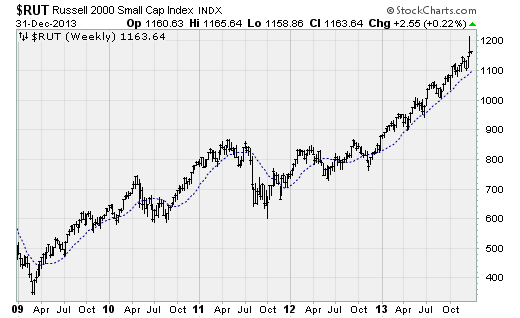Will 2014 repeat 2013's epic bull run?
So much for triskaidekaphobia, or the fear of the number 13. The year 2013 is going down as one of the best years in market history and the best annual performance since 1995 for the Dow Jones industrial average.
After all the volatility, backtracking, and troubles coming out of the 2009 bear market low, this was the year that everything came together. The S&P 500 gained 29.6 percent in a smooth, unruffled rise that marked a departure from the noise and volatility we've suffered lately. The Dow climbed 26.5 percent.
Small cap stocks in the Russell 2000 put up an even more impressive performance, rising 37 percent without closing a single week below the index's 20-week moving average. That's a rare run of consistency last seen in 2003 during the rise out of the dot-com rubble.
Compare this year's run-up to the 11.3 percent average annual return the S&P 500 posted between 1928 and 2012 or the 8.7 percent average annual return it posted since 2002.
Persistent fears faded into the background as the year progressed. The Eurozone debt crisis was forgotten. The Arab Spring has largely gone into hibernation as the showdown over Syria fizzled and the Iranian nuclear talks progressed. The fiscal fights in Washington have given way to some real, actual, bi-partisanship that resulted in a two-year budget deal.
The economy has recovered from a slowdown scare at the beginning of the year related to the fiscal cliff showdown, with job growth accelerating and the unemployment rate poised to drop below 7 percent, businesses feeling good enough to swell inventories, and a labor shortage beginning to emerge as executives report a tighter time finding qualified applicants.
But above all, it was the year that the flood of cheap money from the world's major central banks -- provided via multiple iterations of bond purchase stimulus programs -- finally washed over the problems that had been nagging at investors.
Academics tell us that monetary policy operates with about a nine month lag as changes to the price of money filter through the financial system. So when the yield on 10-year Treasury notes hit a record low of 1.4 percent in July 2012, the full effect didn't hit us until January -- and carried through the rest of the year.
And that leads me to sound a warning as we head into 2014.
The perfect confluence of conditions that drove stocks higher in 2013 has already started to end. Interest rates have surged higher as the Federal Reserve and other central banks finally begin the process of backing away from the greatest experiment in monetary conjuring in human history.
The 10-year Treasury yield has pushed back above 3 percent, more than doubling from its low and putting pressure on the housing market. This rapid increase, should it continue, will have unknowable consequences on a bond market that's been operating in a falling rate environment since the early 1980s.
There is also plenty of evidence of the kind of irrational exuberance that occurs as bull market enter their final, and most alluring, phase. The excitement over Twitter (TWTR), a company that is and will not be profitable for years but captures the zeitgeist of this cycle's mobile social/tech excitement, feels a lot like what was happening in Las Vegas tract homes circa 2005 or all the unprofitable online obsessions of 1999.
There are signs of market shenanigans that will surely learn about later -- just as the sins of the housing bubble and Wall Street's forging of AAA-rated mortgage securities from garbage was later criticized. You can see this in the way the stock market mirrors the action in the foreign exchange market, slavishly following the action in the dollar-yen and euro-yen currency rates. You can see this in the way markets are reacting seconds ahead of major economic and policy announcements.
And despite the market's progress, the real economy for average Americans is still on the mend. Disability and food stamp enrollment remain at or near record highs. The personal savings rate has fallen to a nine-month low as real personal disposable income per capita is actually contracting on a year-over-year basis.
What we need to see is a reorienting of economic benefits away from the corporate sector and record profits back towards wage earners. And there are signs this is happening, as companies are increasingly reporting that labor costs are now rising faster than the pace at which they can raise costs to customers. While that's good for the country, it's bad news for the fat profit margins that have been helping fuel the market's rise.
As things stand now, all the catalysts that stocks enjoyed in 2013 -- record profitability, record low interest rates, low inflation, a steady inflow of cash from money market funds, relative calm in Washington -- may not be carried into 2014.
The party might end as soon as February when the $17.2 trillion national debt and the need to raise the debt ceiling will once again bring Republicans and Democrats to loggerheads ahead of the 2014 mid-term elections.
